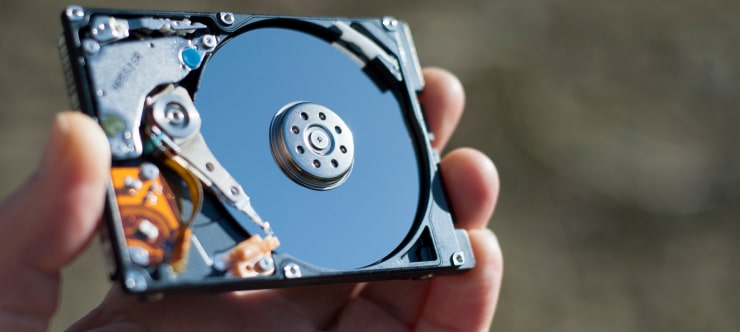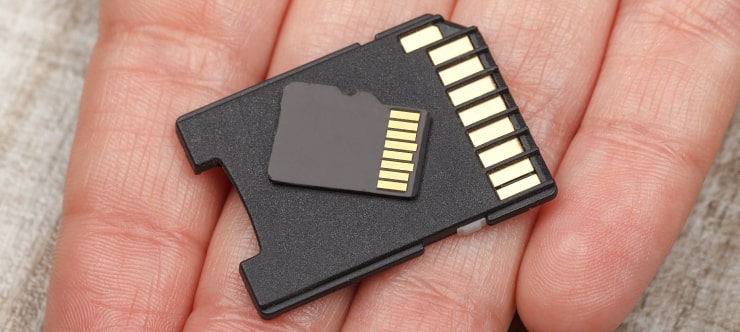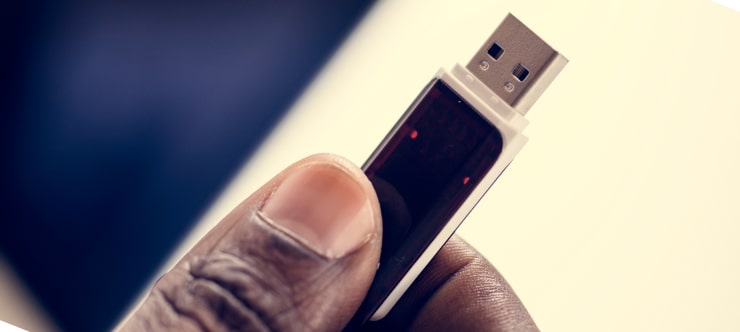World Backup Day 2025

I think there's an issue with my storage device, but I'm not sure
Start a free evaluationA small animation studio is on the brink of releasing its most ambitious project yet—a heartwarming animated film set to captivate audiences worldwide. After years of hard work, the team is days away from finalizing the movie when disaster strikes. A simple misstep—an accidental command—wipes out nearly all the project files stored on their servers. Panic ensues as animators, editors, and directors scramble to recover their work. The studio faces the grim reality that years of effort may be lost forever.
This fictional tale mirrors a real-life near-catastrophe in 1998, when Pixar almost lost Toy Story 2. A command was accidentally entered into their system, deleting 90% of the film’s data from servers. At first, it seemed like all was lost. Luckily, thanks to a lead technical director who had recently backed up the entire movie onto data tapes, Pixar was able to recover the files and complete what would become one of the most beloved animated films of all time.
World Backup Day reminds us to safeguard our data proactively. The idea started on Reddit in 2011 when a user suggested a yearly event to encourage people to save their files and photos. Other users and even companies joined in.
Whether you’re an animator working on your next masterpiece or a business managing sensitive customer information, having a solid backup plan can mean the difference between recovery and catastrophe.
What is a backup?
A backup is essentially a duplicate copy of your data, whether it's a single file or an entire dataset. This duplicate serves as a safety net, ensuring that your data remains secure and accessible even if the original files become corrupted, damaged, or lost. Backups are crucial for both personal and business data as they protect against a wide range of risks, from accidental deletion to hardware failure and cyberattacks.

For businesses, it's essential to consider the type of data being backed up to ensure compliance with data protection regulations. This includes understanding which data is critical for operations and ensuring that backups are stored securely and accessed only by authorized personnel.
Why should I back up my data?
The consequences of data loss can range from minor inconveniences to catastrophic business failures.
Data loss can be due to:
- Human Error: Accidental deletion or mishandling of storage devices is a leading cause of data loss. A recent report revealed the cause of 64% of downtimes are human errors.
- Hardware Failure: Hard drives crash, SSDs fail, and devices can get damaged due to accidents or the device’s natural life cycle.
- Cyberattacks: Ransomware attacks are on the rise, encrypting data and demanding hefty ransoms for its return.
- Natural Disasters: Fires, floods, earthquakes – natural disasters can wipe out local data storage.
Backups ensure that businesses can quickly recover from data loss incidents, minimizing downtime and maintaining essential operations. Research highlights that 93% of companies that lose their data centers for over 10 days file for bankruptcy within one calendar year. But with reliable backups, you can promptly restore files, applications, and systems even if a device fails or is compromised.
Backups also ensure compliance, as certain industries and regulations require data retention and recovery capabilities.
How often should you back up?
If you need your data on demand, it doesn’t matter if it’s business data or personal - you must create backups regularly. However, the frequency of backups will vary according to data usage and data type. Businesses that don’t change or add new data daily can make weekly backups. On the other hand, organizations that depend on data for daily operations should have their backups scheduled daily.
Despite the risk and the yearly reminder, many users still do not back up their data. Considering how storage devices can get damaged easily (like a phone getting run over by a car), permanent data loss is a very real threat to the unprepared.
According to a survey by Backblaze, only 10% of users create backups daily, a decrease from 2023, when 11% of users created daily backups. On the other hand, it’s also an improvement as in 2023, 18% never made a data backup, against 16% in 2024, indicating people are getting more concerned about data loss prevention.

Pro tip: Whether you choose cloud services or local storage, set reminders, schedule backups daily or weekly, and ensure all data is current.
How do I back up my data?
Whether you are an individual user safeguarding personal files or a business securing operational data, following a structured backup strategy ensures that your information remains accessible and recoverable when needed.
The "3-2-1" rule is widely recognized as a gold standard in backup strategies. It ensures redundancy and minimizes the risk of losing all copies of your data in case of failures or disasters. Here’s how it works:
3 Copies of Data: Create at least three copies of your data—one primary copy (the original) and two backups.
2 Different Media Types: Store your backups on at least two different types of storage media, such as an external hard drive and cloud storage, to reduce the risk of simultaneous failure.
1 Offsite Copy: Keep one backup copy offsite to protect against local disasters like fires, floods, or theft.
For example, a small business might keep its primary data on a local server, back it up to an external NAS device, and store another encrypted copy in a cloud-based service.

Planning a backup strategy involves several key considerations:
- Reliable Storage Media: Choose storage devices or cloud services that are reliable and suitable for your needs. Options include external hard drives, NAS devices, or cloud storage services like Google Drive or Dropbox.
- Multiple Copies Across Devices: Maintain multiple copies of your data across different devices. This could mean having one copy on a local hard drive, another on an external drive, and a third in cloud storage.
- Off-Site Storage: Store at least one copy of your backups off-site. This could be in a cloud service or at a different physical location. Off-site storage protects against local disasters like fires or floods.
- Scheduled Updates: Set a schedule for updating backups. This could be daily, weekly, or monthly, depending on how frequently your data changes.
Testing your backups
Creating backups is only half the battle; ensuring they work when needed is equally important. Regularly test your backups to verify their integrity and retrievability:
- Perform periodic restore drills to confirm that files can be recovered without errors.
- Check that all critical files are included in the backup.
- Ensure that encryption keys (if used) are securely stored and accessible during recovery.
Backup testing is especially important for businesses that rely on low Recovery Time Objectives (RTOs) to minimize downtime during incidents.
Tools and methods for backing up data
There are several tools and methods available to implement a robust backup strategy. Here’s an overview of the most effective options:
1. Cloud storage services
Cloud backups are particularly useful for offsite storage as they protect against physical disasters and provide automatic syncing. Cloud storage offers convenience, scalability, and accessibility from anywhere with an internet connection. Popular services include:
- Google Drive: Ideal for personal users and small businesses with integration into Google Workspace.
- Microsoft OneDrive: This is a great option for organizations using Microsoft 365.
- Amazon S3 or Backblaze B2: Suitable for businesses needing scalable cloud storage with advanced features.
2. External hard drives and NAS devices
For local backups, external hard drives and Network-Attached Storage (NAS) devices are reliable options:
- External Hard Drives: Affordable and portable, these are ideal for personal users or small businesses requiring quick access to backups.
- NAS Devices: These are more advanced solutions that allow multiple users to back up data simultaneously over a network. They are perfect for businesses needing centralized local storage.
3. Automated backup software
Automating backups reduces the risk of human error and ensures consistency. Software like Acronis True Image, Veeam Backup & Replication, or Macrium Reflect can schedule backups to run daily, weekly, or even hourly. Many solutions also offer encryption to secure sensitive data.
What should I do if I lose my data and there is no backup?
Discovering that your data is lost and you have no backup can be alarming, but immediate action is crucial to maximize recovery chances.
First, stop using the affected device to prevent further data overwrites or physical damage. If the device is physically damaged (e.g., dropped, water-damaged, making unusual noises), do not attempt to repair it yourself; instead, seek professional data recovery services immediately.
For devices that are still functioning but have missing files, you can try using reputable data recovery software to retrieve lost data, but avoid saving new files to the device to prevent overwriting. It’s essential to understand that DIY recovery attempts can sometimes worsen the situation, especially with physically damaged devices. Therefore, for valuable or critical data, it’s always best to consult professionals like SalvageData, who possess specialized tools and expertise to recover your data. Acting quickly and making informed decisions can increase your chances of a successful recovery.
Related services
These are the most commonly requested data recovery services. At our headquarters' cleanroom lab, our certified engineers conduct a thorough review of any type of physical storage device, determining if there is logical or physical damage and carefully restoring all of the lost files.ces.

External Drive Data Recovery
We recover data from both external SSD and HDD drives. Rely on certified experts to restore your important files from damaged or corrupted external drives.

Hard Drive Data Recovery
Recover data from all brands of HDD, PC hard drives, and hybrid disks. Our specialists ensure fast and secure recovery for any data loss scenario.

NAS Data Recovery
Recover data from NAS devices, including RAID configurations. Our team handles all types of NAS systems and ensures data recovery with minimal downtime.

RAID Data Recovery
Our RAID data recovery services cover RAID 0, 1, 5, 10, and other configurations. We offer expert solutions for failed, degraded, or corrupted RAID arrays.

SAN Data Recovery
Our team specializes in handling SAN devices from leading manufacturers like Dell EMC, HP, and IBM, ensuring efficient recovery with minimal disruption to your operations.

SD Card Data Recovery
Our recovery experts specialize in restoring data from SD and memory cards. We guarantee quick recovery with a no-data, no-charge policy.

SSD Data Recovery
Our data recovery experts handle all SSD data loss scenarios with advanced tools, ensuring maximum recovery with high-security protocols.

USB Flash Drive Data Recovery
Recover lost data from USB flash drives, regardless of the damage or brand. We offer free in-lab evaluations to assess data recovery needs.
If you’re unsure about which data recovery service to choose, let our team assist you in selecting the appropriate solutions. We understand the anxiety that comes with a sudden drive failure, and we are more prompt in our actions compared to other recovery service providers.



